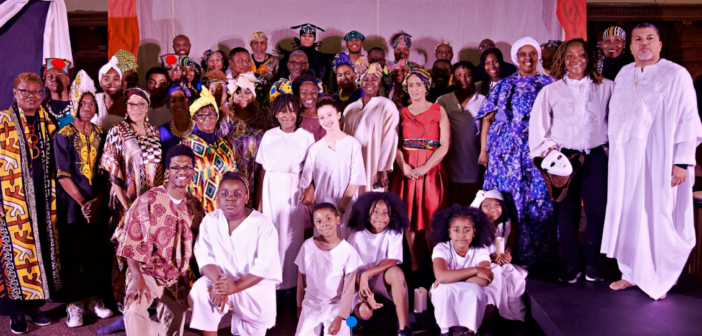Rev. Dr. Gregory James Edwards, founder and senior pastor of the Resurrected Life Community Church, and his congregation held three performances earlier this month of the Maafa Commemoration Project Lehigh Valley.
The project, referred to as the Maafa, is a choreographed musical that tells the story of the Transatlantic slave trade. It was produced by the Touchstone Theatre and Resurrected Life Community Church. The play was written by playwright Nehprii Amenii.
The first performance, held on Oct. 1, was a preview performance and a public viewing before the official opening.
Edwards said the word Maafa is not owned by any culture and it is the Swahili word meaning great tragedy.
Professor of biological sciences Jennifer Swann said the project is composed from a series of narratives that were collected from former slaves. She said it aims to show the audience the journey and experiences of these formerly enslaved people.
“There are many who are in denial about the realities of the transatlantic and American slave trade and its deep impact on the psyche of America,” Edwards said.
Edwards said each of the three shows had nearly full audiences.
Amenii said the plotline of the Maafa shows African people being together in their own glory as a sound and healthy civilization.
“There can only be healing if there is truth telling,” Edwards said. “And certainly we live in a time in our nation where the truth is not always received as a welcome or invited guest. The inspiration behind the Maafa is this notion of radical truth telling about the history of America and some of its origins with the understanding that this truth will bring hope and healing.”
Amenii said her inspiration for the show comes from the lack of acknowledgement of the “greatest mass kidnappings to have taken place,” that were sanctioned by both church and state.
Amenii said one of the most important parts for her when writing the script was to avoid framing African people as victims or powerless, but rather to place them in a wider context as being divine and sacred people.
Edwards said Rev. Dr. Johnny Ray Youngblood, senior pastor of St. Paul Community Baptist Church in Brooklyn, New York, began the production of the Maafa in 1995. Edwards said it has been done in a variety of ways throughout the country by Black led organizations and institutions.
Edwards said he knew about various productions of the Maafa because the Resurrected Life Community Church held events in years past bringing members of the church and the Lehigh Valley community to see the production at the place of its inception.
The storyline the Resurrected Life Community Church chose to adopt is different from the original production, although Edwards said the history remains the same.
Edwards said preliminary auditions lasted about two to three weeks. Performers were asked to send a video of them reading a monologue, singing a song or performing in something prior. Afterwards, he said they primarily held live auditions.
“(There) was all of this gold that was flickering in the spirit of the people that were coming in to be a part of this,” Amenii said.
Amenii said she was hoping there was a growth in each person individually, in relationships and an overall joy in coming together to make the production happen. She hopes the experience made everyone involved feel richer and stronger.
According to the Touchstone Theatre, The Maafa Commemoration Project Lehigh Valley is a part of Festival UnBound, a five day celebration and conversation meant to engage the diverse community through art and civic dialogue in the Lehigh Valley.
“The Lehigh Valley, which has become increasingly racially diverse, oftentimes continues to be in denial about how diverse we are and its history and involvement in some of the horrors such as the slave trade that happened in America,” Edwards said.
Swann, also interim director for Lehigh’s Africana Studies program, said she was able to connect Lehigh with Touchstone Theatre to do externally focused events for students.
Swann said there were no Lehigh students at the performance.
“I am disappointed that people at Lehigh could not find the time or the energy to go see the play,” Swann said.
Edwards said the arts, when done well, have the capacity to inspire others. He said he hopes to produce the Maafa annually and improve each year.






Comment policy
Comments posted to The Brown and White website are reviewed by a moderator before being approved. Incendiary speech or harassing language, including comments targeted at individuals, may be deemed unacceptable and not published. Spam and other soliciting will also be declined.
The Brown and White also reserves the right to not publish entirely anonymous comments.